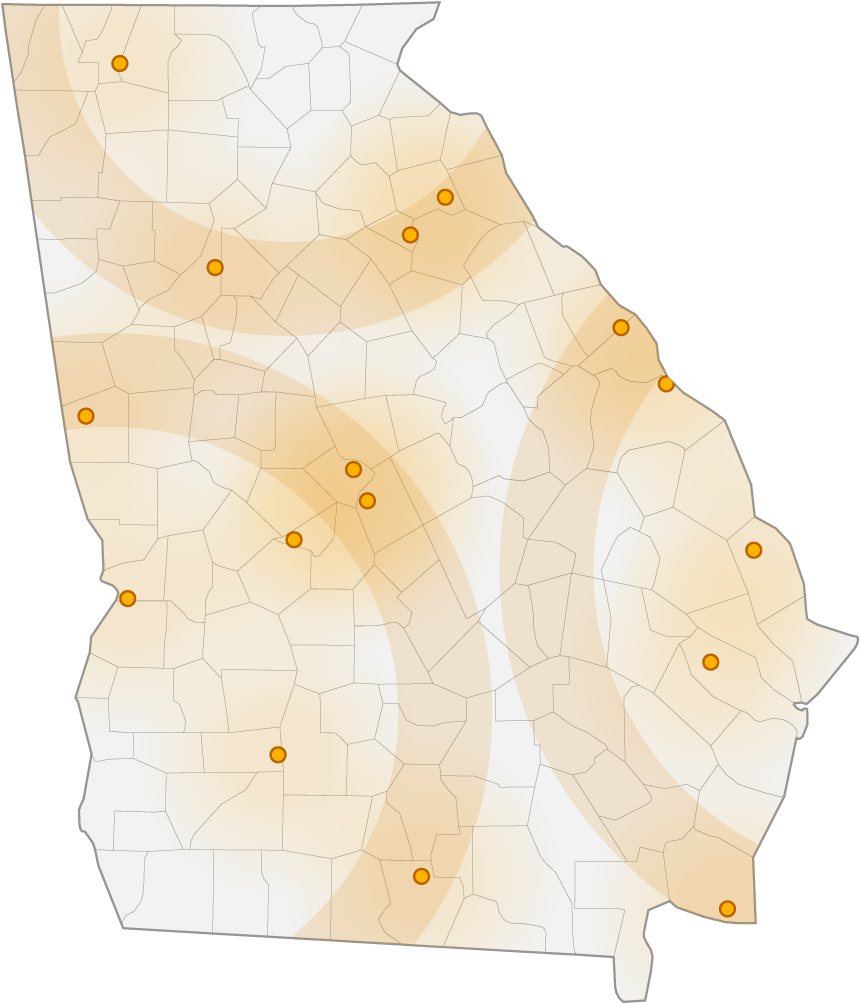Benefits of Solar Energy
Sunlight is one of Georgia’s most abundant resources with an average of 218 sunny days per year. More than 3,000 MW of solar resources, or approximately 12% of our total capacity*, generate significant carbon-free energy for Georgians during sunny, daylight hours.
Georgia has consistently been in the SEIA Top 10 for solar photovoltaic installations for the past 10 years, and our state has one of the largest voluntary solar portfolios in the country.
Disclaimer about our capacity mix, DSOs and RECs
Our capacity mix reflect nameplate capacity for renewable resources, program capacities for third-party Demand-Side Options (DSOs), and designated/demonstrated capacity for the remaining fuel types. A portion of the renewable generation capacity includes capacity where the renewable generator retains the related Renewable Energy Credits (RECs).
How Solar Works
A photovoltaic solar panel system requires little maintenance and can produce power for more than 20 years.

Panels absorb photons from the sun that begin to stimulate the electrons in the panel material.

Eventually enough movement causes the electrons to split off from their atoms.

The electrons are then guided in an ordered fashion, forming an electrical current.
Our Solar Facilities
Not all solar facilities you may come across belong to Georgia Power. We have constructed and are operating 16 solar farms and additional demo facilities across the state of Georgia, many in partnership with military installations. The largest, at 128 MW of capacity, is located at Robins Air Force Base in Warner Robins, Georgia. Other facilities add carbon-free energy to the grid and supply renewable energy in support of our Community Solar program.
1. North Georgia
Comer |
2,160 kW |
Dalton |
6,508 kW |
Falcons Solar |
1,019 kW |
UGA |
984 kW |
2. South West Georgia
Fort Benning |
30,005 kW |
Fort Valley |
10,800 kW |
LaGrange |
800 kW |
MCLB |
31,161 kW |
Moody AFB |
49,500 kW |
Robins AFB |
128,000 kW |
Tri-County EMC |
1,008 kW |
3. East Georgia
Fort Gordon |
30,000 kW |
Fort Stewart |
30,000 kW |
Guyton |
3,600 kW |
Kings Bay |
30,161 kW |
Waynesboro |
2,400 kW |

North Georgia
| Comer | 2,160 kW |
| Dalton | 6,508 kW |
| Falcons Solar | 1,019 kW |
| UGA | 984 kW |
Southwest Georgia
| Fort Benning | 30,005 kW |
| Fort Valley | 10,800 kW |
| LaGrange | 800 kW |
| MCLB | 31,161 kW |
| Moody AFB | 49,500 kW |
| Robins AFB | 128,000 kW |
| Tri-County EMC | 1,008 kW |
East Georgia
| Fort Gordon | 30,000 kW |
| Fort Stewart | 30,000 kW |
| Guyton | 3,600 kW |
| Kings Bay | 30,161 kW |
| Waynesboro | 2,400 kW |
Want to sell solar energy?
Now everyone can use solar!
From home installation or buy back programs, to workplace solutions or non-installation options, our goal is to make solar an option for every Georgia Power customer.
Not sure what solution is right for you?
Use our solar adviser tools to find the best solution for your sustainability goals.
Frequently Asked Questions
How do solar panels generate electricity?
Solar panels absorb energy from the sun by way of a semiconductor (typically silicon) and generate a direct current electrical source. An inverter is used to convert the source to an alternating current source. Learn more about How Solar Works.
Can I install solar photovoltaic (PV) panels at my home or business?
Yes, as long as the location selected is clear of obstructions that will block the sunlight. Some shading may be unavoidable, but you want it to have direct sunlight most of the time. Please review our Solar Programs to learn more.
Are Georgia Power and Southern Company testing different solar technologies?
Yes, Southern Company and EPRI are currently testing multiple PV technologies in Georgia and across our territory.
How do PV technologies differ?
Some of the key ways solar PV technologies differ is by temperature coefficient and efficiency. The temperature coefficient represents the relative change in power output with respect to the ambient temperature. Solar panel efficiency is related to the quality of the panels and solar cell technology (monocrystalline, polycrystalline, thin film). Panel efficiency commonly ranges from 12-21 percent with respect to the cell technology.
Does Georgia Power sell solar systems or recommend specific systems?
Please view our Solar Programs to find out more about partnering with Georgia Power on your solar installation. You can also check with qualified installers through NABCEP for their recommendations on the correct system to meet your needs.
Can cloudy days impact solar panel effectiveness?
Yes, clouds can diffuse and/or block sunlight. This will restrict the amount of sunlight absorbed by the solar panels and can reduce the energy output by 40-90 percent.
How much is the federal tax credit for customers?
An uncapped 30 percent Federal Investment Tax Credit (ITC) is available to homeowners for solar equipment placed in service by December 31, 2019. The tax credit will be 26 percent for systems placed in service in 2020, 22 percent for systems in service in 2021, and 0 percent for systems in service after 2021. For commercial systems placed in service after 2021, the tax credit will be 10 percent (Business ITC). Find information about tax incentives at the Database of State Incentives for Renewable Energy and Energy.gov. Please consult your tax advisor to determine how this federal incentive may apply to your particular circumstances.
How can I use solar panels to power my house at night?
Battery storage may be ideal for some small Scale PV systems. However, this method requires additional maintenance, and can be costly. Most customers remain connected to the grid for access to continuous, reliable electricity at all times.
What size PV system do I need to power my home or business?
PV system size is directly related to how much generation you need and the available area you have. By observing your monthly and annual usage, you can calculate your ideal PV system size.
How much does a typical installed PV system cost?
The installed cost of solar PV systems can range from $2,000 – $4,000 per kW depending on multiple factors, including technology, location, size of the installation.
How long does a typical solar panel last?
Most solar panels are under warranty to produce 80 percent efficiency for 20-25 years, though some panels have been known to perform for more than 40 years.
Can I install my PV system on my house myself?
Georgia Power recommends that you use professional installer for PV installations. Compliance with local building and electrical codes may be required.
How much space is required for a 4 kW PV system?
A good area estimate is about 60 square feet per kW or about 240 square feet for a 4 kW system. This varies for each solar panel.
Is maintenance required for PV systems?
Yes, minimal maintenance is required. To ensure maximum output, panels should be cleaned of debris and anything else that can block the sun. Some components may need regular inspection by a professional.
Where can I find a licensed contractor to install my solar panels or solar water heater?
Georgia Power recommends using a solar installer who is certified by the North American Board of Certified Energy Practitioners. Visit their website to learn more about NABCEP and find certified professionals in Georgia. We're also available to help with your installation through our Solar Programs
What kind of questions should I ask when choosing an installer?
In addition to price, and any other factors that may be important to you, consider the following factors when selecting a renewable energy installer:
- Is the company certified?
- Is the company experienced?
- Will the company provide a copy of their current business license?
- Does the company have any judgments or liens?
- Will the company provide references?
- Does the company have a record with the Better Business Bureau?
- How many systems has the company installed in the last year?
- How long will the installation process take?
- How long will the company monitor the installations after they are completed?
- What is the warranty period? What does it cover?
- What repair services are offered? What are the rates?
- What type of operation or maintenance training is available?


